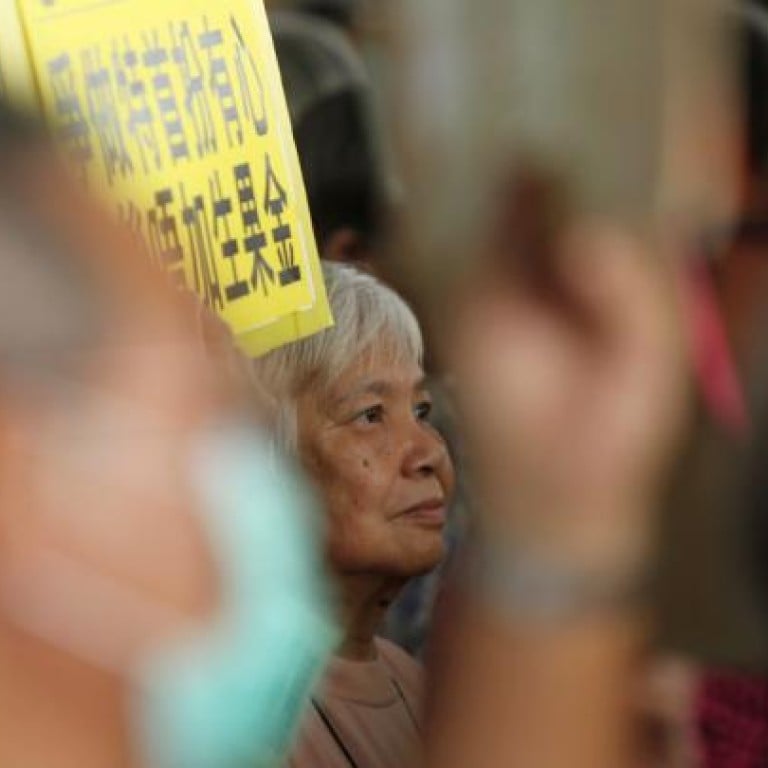
Planning for an ageing population means no blanket payouts for elderly
Philip Bowring says that non-means-tested subsidies for the elderly will squander resources that should be better used to address Hong Kong's long-term population challenges
Are the pro-democracy parties that oppose means testing of allowances for those over 70 years old really interested in the welfare of the poorest? Are they opposing the government for the sake of it, or do they believe their voters are those in the middle-income bracket, not the old folks who get entertained by the Democratic Alliance for the Betterment and Progress of Hong Kong?
The largest percentage of poor people is found among the elderly. We should remember why that is. Many of those who worked hardest in the 1960s and 1970s to build this economy are now facing penury, trying to make a living by gathering rubbish at 80 while the civil service retires on a full pension at 60. The biggest divider is ownership of property and shares. Mass private ownership of flats did not begin till the mid-1970s. Then, high down-payments and 12- to 15-year mortgage repayment terms excluded those already well into middle age.
The nearly 50 per cent of the population who were never able to buy a flat have seen their savings eroded by the interest rates on deposits that in most years fell below inflation. Owners of property and shares benefited, the other half of the population suffered. With interest rates now so low, even a couple who managed to save HK$1 million now get a return of almost nothing. Meanwhile, those on the property bandwagon benefit from those low interest rates and get income tax breaks as well.
For sure, roughly half the population was and remains partly protected by cheap public housing and health care. But cash income is necessary for those who are no longer able to work. For those who lack family support in old age, the situation is especially dire. For all the talk about Chinese family values, reality is too often different. Offspring may have meagre incomes themselves, have migrated or have flats too small for their parents. Like it or not, Hong Kong has followed the Western pattern of unitary households.
These problems are not all of the government's creation. Some stem from the dollar peg as well as the creation of an artificial land shortage. But the government has a particular obligation to provide much more help for those most hurt by circumstances not of their own making. It is a selective obligation, not one applicable to all. Instead of blanket payouts, focus on specific needs, not just on the elderly but also for the next generation.
This is not just a question of achieving fairness now, taking an affordable and practical step to reduce inequality. It is one of preparing for a future in which the percentage of the population over 65 is expected to rise from 13per cent today to 23per cent by 2026 and the ratio of dependent elderly to the working population will rise from 0.18 to 0.35.
According to research by the highly numerate David Webb, a blanket old age allowance would cost an extra HK$13 billion annually now, rising to HK$32 billion in 2024. This may still seem small compared with throwing billions on non-commercial boondoggles like the high-speed train to Guangzhou, but it would be an increasing burden on the treasury at a time when a better educated workforce should yield a lower proportion of retirees actually needing support.
Blanket subsidies for the old take away from other needs that are growing - notably, health care - and from one which should be growing - direct support in the form of nursery schools, job protection for mothers and so on, in place of tax allowances which mostly benefit the better paid. The plethora of little welfare schemes loved by civil servants, such as selective transport subsidies and the one-off handouts favoured by Donald Tsang Yam-kuen, need to go. Instead, poverty should be tackled directly by raising the minimum wage, further increasing means-tested allowances for the old, outlawing mandatory retirement and focusing public housing on young families and small flats for the old.
Hong Kong's demographic future demands other measures. Among current absurdities is retirement at 60 for civil servants, which benefits the upper levels particularly. Hong Kong should be encouraging people to stay in work as long as they are willing and able. The government sets an appalling example.
Second, we need an urgent revamp of the Mandatory Provident Fund to raise contribution levels and break the costly oligopoly of providers. Fees and charges are far higher than in other economies and are testament to the way big business has civil servants in its pocket. The public will rightly rebel against raising MPF contributions while this racketeering persists.
The government could also make people more aware of the future need to rely on the MPF by injecting HK$200 billion or so from its excess reserves into individual accounts on the basis of number of years of membership. That alone would reduce future calls on welfare, giving back to the people what belongs to them, leaving them more able to fend for themselves in old age.
There is nothing wrong with a means test - we already have one for the CSSA. Leung Chun-ying's proposal should be accepted as long as the government also commits to getting away from ad hoc measures to a long-term plan for an ageing population and reducing the costs of rearing a new generation.

